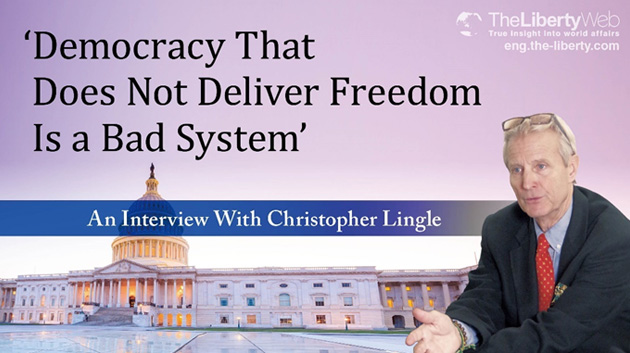‘Democracy That Does Not Deliver Freedom Is a Bad System’
An Interview with Christopher Lingle
Pro-Japanese, libertarian member of the Austrian School of Economics expresses his view on the Japanese economy.
We interviewed him on his predictions for Japan’s economic recovery.
Interviewer: Hanako Cho
Christopher Lingle
Born in Georgia, USA, in 1948. Received a doctorate in economics from the University of Georgia graduate school in 1977. A research fellow at the of Centre for Civil Society Think Tank. Nurtures libertarian activists in the Atlas Network. The author of “Understanding China’s Socialist Market Economy,” among many others.
Q: What do you think is the cause of the stagnation of the Japanese economy?
Mr. Lingle (abbreviated L henceforth): The Nikkei Stock Average was 38,000. It hits its maximum in 1989. Now, 30 years later, the stock average is just below 33,000. Its valuation hasn’t recovered.
Keynesian economics was the mainstream theory in Japan back then and now. The government should spend more to promote economic growth—the idea behind the theory has driven up government debt in Japan for 30 years. Covid piled on top of this, and the government debt hit a record high.
The situation was mitigated by the Central Bank’s low-interest policy. There is an idea in economics that if you want to have economic growth, you lower interest rates, because people borrow more money which stimulates the economy.
But think about it. How is it that I would loan you money for zero nominal interest rates or negative nominal interest rates unless you were my family or a very good friend? This goes against human nature.
Central Bank Cannot Raise Interest Rates in Fear of Government
Q: Inflation is causing ordinary households to suffer in Japan.
L: Price inflation is ultimately about monetary policy. It is about the central bank putting too much money out there creating more liquidity. The United States Federal Reserve Bank (FRB) began to raise interest rates, but Japan does not want to raise theirs.
Why? Because they have such enormous debt. If they need to pay higher interest rates, then their debt will consume a much larger portion of the federal budget, and there will be less money to spend on all the other things like defense.
Unlike Greece, Japan does not default, even with a 260% GDP ratio, because they have Sony. They have Honda. They have Toyota, which all pay taxes that support the government. However, there will be a limit to this.
To spend more money, nations need to have economic activities that match their spending.
The idea that low interest rates and an increase in government spending lead to economic growth is wrong. Rather, the economy stimulates when people have innovative ideas, and they are given opportunities and the freedom to try out their new ideas.
Political Decisions Can Create Tremendous Waste
We must understand that government spending can inhibit an economy from growing depending on the context. Government spending creates tremendous waste. If a civilian corporation were to waste their resources, they would go bankrupt. Banks do not lend money to such corporations. Meanwhile, the government does not have to think about profits, so they continue to spend and spend.
When governments begin to control the economy, they make more decisions based on political logic and less follow economic logic. This leads to enormous waste.
Zero-interest policy and negative-interest policy, as well as the increase in government debt—even though the Japanese government has failed to grow its economy for 30 years–itsfinancial institutions continue to cling onto their economic model that may seem reasonable at first sight but is actually wrong.
American Revolution Was About Restraining Political Power
Q: What is the cause of all this?
L: It is because the politicians’ actions are based on “power.” Giving up Keynesian economics is equivalent to giving up their control of the entire economy.
The American Revolution was about restraining political power. At the time, people believed that government should be a “way” of securing our humanity, our property, our lives and our freedom. However, we have somehow lost these ideas.
This has partly happened because we have made democracy our ultimate goal. I sometimes give lectures on “happiness economics.” I believe that the ultimate goal is freedom. Democracy is meant to be an instrument to deliver freedom. What’s more, democracy can be an enemy to freedom. For example, if the majority of the people thought that they should have the same privileges and rights, then they would demand for subsidies by taking what’s not theirs and having them redistributed among everyone. This takes away my freedom and violates the rules of law. Americans no longer believe in “freedom.” Instead, they all talk about “democracy.” However, if a system does not deliver freedom, then it’s a bad system. We need an education system that creates good citizens for democracy.



















